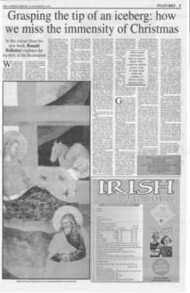Page 5, 25th December 1998
Page 5

Report an error
Noticed an error on this page?If you've noticed an error in this article please click here to report it.
Tags
Share
Related articles
More Time For Juggling The Turkey
Ronald Rolheiser
Lionel Fanthorpe Birds And Animals Of The Bible...
Being God's Body On Earth
Arrival Of Visible God
Grasping the4ipof an iceberg: how we miss the immensity of Christmas
In this extract from his
new book, Ronald Rolheiser explores the
mystery of the Incarnation
WE MEASURE time in relationship to the birth of Jesus. All dates end with a tiny suffix. BC or AD, indicating whether an event took place before Jesus's birth or after. The whole world does this. There are reasons beyond the purely religious why this is so. Nonetheless, the fact that
the whole world records time in relationship to the birth of Jesus does indicate something about his importance.
For those of us who are Christians, time obviously should be measured by when Jesus was born. For us, he is the centre of everything: our meaning, our hope, our seIfunderstanding, our church lives, our theologies, and our spiritualities. He is also the guide for our discipleship.
The central mystery within all of Christianity, underginiing everything else. is the mystery of the Incarnation. Unfortunately, it is also the mystery that is the most misunderstood or, more accurately, to coin a phrase, under-understood. It is not so much that we misunderstand what the Incarnation means. it is more that we grasp only the smallest tip of a great iceberg. We miss its meaning by not seeing its immensity.
The mystery of the Incarnation, simply stated, is the mystery of God taking on human flesh and dealing with human beings in a visible, tangible way. The radical character of this, however. needs some explanation, especially as it pertains to three things: why God would act in this way; the shocking rawness of this kind of act, and its ongoing, rather than one-shot, character.
Why would God want to take on human flesh? Why would an infinite power want to limit itself within the confines of history and a human body? Why Incarnation?
There is a marvellous story told about a four-year-old child who awoke one night frightened, convinced that in the darkness around her there were all kinds of spooks and monsters. Alone, frightened, she ran to her parents' bedroom. Her mother calmed her down and, taking her by the hand, led her back to her own room where she put on a light and reassured the child with these words; "You needn't be afraid, you are not alone
here. God is in the room with you." The child, replied: "I know that God is here, but I need someone in this room who has some skin!"
In essence, that story gives us the reason for the Incarna tion, as well as an excellent definition of it. God takes on flesh because, like this young
girl, we all need someone with
us who has some skin. A God who is everywhere is just as easily nowhere. We believe in what we can touch, see, hear, smell, and taste. We are not angels, without bodies, but sensual creatures in the true sense of the word "sensuality".
We have five senses and we are present in the world through those senses. We know through them, communicate through them, and re-open to each other and the world only through them. And God, having created our nature, respects how it operates. Thus.
God deals with us through our senses. The Jesus who walked the roads of Palestine could be seen. touched, and heard. In the incarnation, God became physical because we are crea tures of the senses who, at a point, need a God with some skin.
Nikos Kazantzakis once explained this by way of a parable: A man came up to Jesus and complained about the hidden ness of God. "Rabbi", he said.
"I am an old man. During my whole life, I have always kept the commandments. Every
year of my adult life. I went to Jerusalem and offered the
prescribed sacrifices. Every night of my life, I have not retired to my bed without first saying my prayers. But... I look at the stars and sometimes the mountains — and wait.
wait for God to come so that I might see him. I have waited for years and years, but in vain.
Why? Why? Mine is a great grievance, Rabbi! Why doesn't God show himself?"
Jesus smiled and responded gently: "Once upon a time there was a marble throne at the eastern gate of a great city. On this throne sat 3,000 kings.
All of them called upon God to appear so that they might see him, but all went to their graves with their wishes unfulfilled.
"Then. when the king had died, a pauper. barefooted and hungry, came and sat upon that throne. 'God.' he whispered. 'the eyes of a human being cannot look directly at the sun, for they would be blinded. How then, Omnipotent, can they look directly at you? Have pity, Lord, temper your strength, turn down your splendour so that I who am poor and afflicted, may see you!' "Then — listen, old man God became a piece of bread, a cup
of cod water, a warm tunic, a hut and, in front of the hut, a woman nursing an infant.
"Thank you, Lord,' he whispered. 'You humbled yourself for my sake. You became bread, water, a warm tunic and a wife and a child in order that I might see you. And I did see you. I bow down and worship your beloved many-faced face."
GO. TAKES ON flesh so that every home becomes a church, every child becomes the Christ-child, and all food and drink becomes a sacrament. God's many faces are now everywhere, in flesh, tempered and turned down, so that our human eyes can see him. God, in his many-faced face, has become as accessible, and visible, as the nearest water tap. That is the why of the Incarnation.
The Incarnation is shocking in the rawness of its physical character. The English word "incarnation" takes its root in the Latin word, camus, meaning flesh, physical flesh. But, in Latin as in English, this is a very un-Platonic word. There is nothing spiritual about it. It emphasises, as do its English derivatives (carnality, carnal, carnivorous) the body in its raw, brute, physical tangibility. Incarnation means incarnus; literally in physical flesh.
We usually do not have much trouble conceiving of Jesus in this way, although, even there, we often hesitate to think of Jesus's body as mortal. sexual, and subject to illness, smell and other humbling bodily processes. The problem rather, as we shall soon point out, is that we do not attribute the same physical reality to the whole Body of Christ, namely. to the Eucharist and the body of believers. Finally, and of critical importance, is the question of the ongoing nature of the Incarnation. The Incarnation is not a thirty-three year experiment by God in history, a one-shot, physical incur sion into our lives. The Incarnation began with Jesus and it has never stopped. The Ascension of Jesus did not men tally change, the Incarnation. God's physical body is still among us. God is still present. as physical and as real today, as he/she was in the historical Jesus. God still has skin, human skin, and physically walks on this earth just as Jesus did. hi a certain manner of speaking. it is nue to say that, at the Ascension. the physical body ofJesus left this earth, but the body of Christ did not. God's incarnational presence among us continues as before. What is being said here?
An initial distinction is key: "Christ", as you know, is not Jesus' surname. We do not say "Jesus Christ" in the same was as we say "Susan Parker" or "Jack Smith". Jesus did not have a surname. The word Christ is a title, connoting God's anointed, messianic presence on this earth, Scripture uses the expression the "body of Christ" to mean three things: Jesus. the historical person who walked this earth for thirty-three years; the Eucharist which is also the physical presence of God among us; and the body of believers, which is also the real presence. To say the word "Christ" is to refer at one and the same time to, Jesus, the Eucharist, and the community of faith.
We are the body of Christ. This is not an exaggeration, nor a metaphor. To say that the body of believers is the body of
Christ is not to say something that Scripture does not; Scripture, and Paul in particular, never tells us that the body of believers replaces Christ's body, nor that it represents Christ's body, nor even that it is Christ's mystical body. It says simply: "We are Christ's body."
Scholars disagree among themselves as to precisely how literally Paul meant this. When he says we are the body of Christ does he mean this in corporate or a corporal way? .tire we Christ's body the way a group animated by a common spirit (say, for instance, the Jesuits) are a body? or, are we a body like a physical organism is a body? With some qualifications (and, of course, some exceptions) Scripture scholars agree that it is the latter. The body of believers, like the Eucharist, is the body of Christ in an organic way. It is not a corporation, but a body; not just a mystical reality, but a physical one; and not something that represents Christ, but something that is This has immense implications. It means that the Incarnation did not end after thirtythree years, when Jesus ascended. God is still here, in the flesh, just as real and just as physical, as God was in Jesus. The Word did not just become flesh and dwell among us — it became flesh and continues to dwell among us. In the body of believers and in the Eucharist, God still has physical skin and can still be physically seen, touched, smelled, heard, and tasted.
But this is not simply a truth of theology, a dogma to be believed. It is the core of Christian spirituality. If it is true that we are the body of Christ, and it is. then God's presence in the world today depends very much upon us. We have to keep God present in the world in the same way as Jesus did.
This article is an excerpt from Seeking Spirituality by Ronald Rolheisen Plodder & Stoughton f7.99, available from The Catholic Herald. Telephone orders on 0171 588 3101
blog comments powered by Disqus















